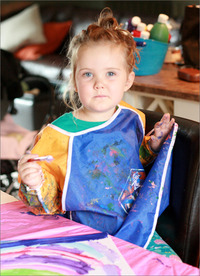Child Development

One of the most exciting times in a family's life is when a new baby arrives home to join their family! Everyone gets excited and can't wait for their new little person to start learning, exploring and trying new things. A child's first six years are critical for building the intellectual, physical, social and emotional foundation that will support them throughout their life.
Each child grows and develops at their own pace and each milestone is eagerly anticipated by all family and friends. It is always a special occasion when a new baby smiles for the first time, rolls from their back to tummy or starts to crawl. The early years are a time when children have a unique capacity to build skills and knowledge that diminishes with age. It is therefore vital to help children develop optimally so they are ready to start school and succeed in life.
As each child is different and unique, parents become very skilled at noticing all the little changes that happen as their child begins to learn and grow. Occasionally, a child hits a small bump along one of their developmental paths, and could benefit from a little help. When children get help early it helps to prevent them from falling behind, and from a small bump becoming a larger hurdle.
As a parent or grandparent, it can be confusing to know what to do if they notice something different about the way their child does something as compared to other children of a similar age. Parents are a great source of information as they see their child every day and are able to monitor their child's development most effectively. Read more here for information and resources to help check your child's development.
Checking Your Child's Development
Checking your child's development is an important part of caring for a little one. If your child should need any amount of extra help, it is easier and more beneficial to get help early, rather than waiting until your young child experiences difficulty learning in school.
The Ages & Stages Questionnaires®
A good tool for checking your child's development is the Ages & Stages Questionnaires® (ASQ). These questionnaires provide an easy way for you to monitor your child's development by completing a questionnaire once or twice a year. The first ASQ you complete is during your baby's six month visit with a public health nurse. Once you have gone through the ASQ process once, it makes using the tool easier each time after that. If parents are worried or concerned about their child's development, they will be able to discuss their concerns with a care provider who can help to find answers or people who can help.
The Ages & Stages Questionnaires® gather information about five areas of development:
- Communication (ex. Am I talking to you? Am I hearing you?
- Gross motor skills (ex. Am I crawling, rolling over, trying to walk?)
- Fine motor skills (ex. Can I use a crayon, pickup small objects?)
- Problem solving (ex. Do I recognize myself in a mirror?)
- Personal – social (ex. Can I feed myself?)
The benefits of completing Ages & Stages Questionnaires® on a regular basis include:
- Parents can watch their children grow and learn new skills
- Parents will have a record of their child's development
- Parents will have a document they can share with their family physician or other care providers
In Kamloops, ASQ's can be obtained at the Child Care Resource and Referral Centre where someone can assist you in matching the correct ASQ and appropriate activity guide for your child's age.
They can be contacted at 250-376-4771 in the JohnTodd Centre at 150 Wood Street, Kamloops BC and online at www.childcarechoices.ca/main/Interior/Kamloops/

